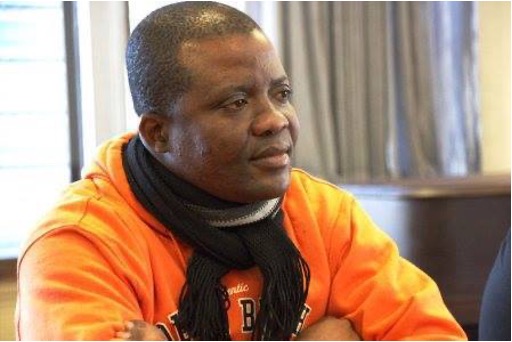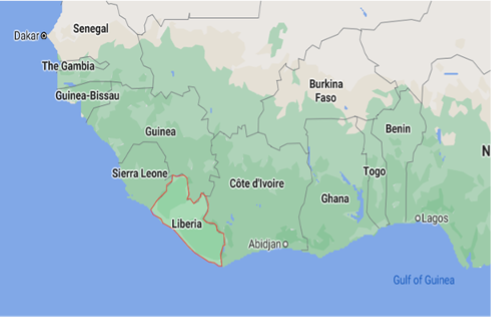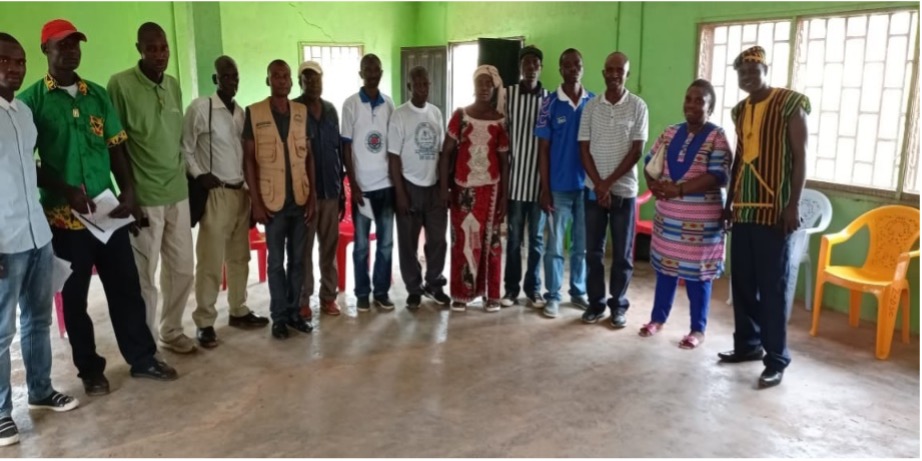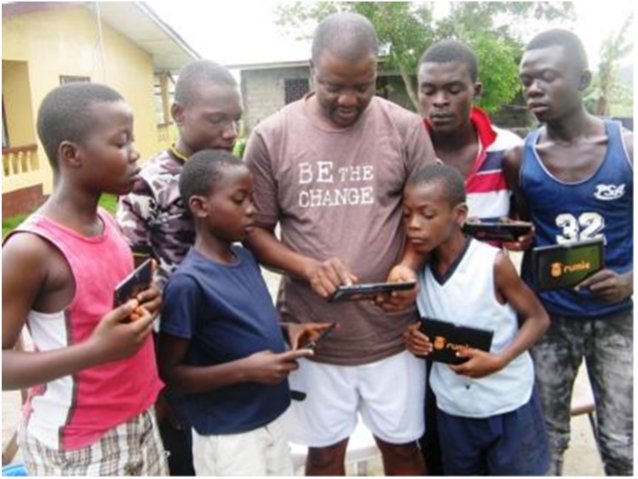
Today, for International Spotlight, I interview Abel Learwellie. Abel is an ISSTD Member from Liberia. I felt incredibly privileged to have this time with Abel, who works with the most extreme trauma, with very little resources, yet gave me a couple of hours out of his very busy day to talk about his work in Camp for Peace, Liberia. For the benefit of our international members, Liberia is a small country on the West Coast of Africa, sandwiched between Sierra Leone and Cote D’Ivoire. (See the map below).
Abel: Apologising for being late, explains: I am so sorry, it took me over 2 hours to get to the office this morning, normally a journey that takes 20 minutes. Today the traffic has many problems. I left at 6 am – and it took 2 hours 20 minutes.
Kate: I will never complain about Sydney traffic ever again! Sometimes it can take us an hour to do a 20-minute journey, but never two hours! Thank you for agreeing to be interviewed for ISSTD News. We are really honoured to have you join us and appreciate you taking the time out of your day. I am wondering if you could start by telling our readers a bit about yourself?

Abel: I am the Executive Director of the Camp for Peace, Liberia… I am one person who keeps on with things, getting things happening. This feels like a 24-hour job, working in a very difficult society like Liberia, which has many challenges. I am a survivor of the Liberian Civil War which lasted for 40 years and was devastating. I was also captured early on in the war and was incarcerated and recruited as a child soldier…. (The internet dropped out at this point, as it did throughout the interview).
Kate (re-starting the interview): So, you were saying that you were captured?
Abel: Yes. I was incarcerated and I was… treated very badly. In the process of the war I lost my father and many friends. I escaped from the war zone and went to exile as a refugee. I resumed my education in exile and graduated. But I came back to Liberia after I graduated from the refugee high school. I came back to continue my education in Liberia…. Then I became a survivor of the Ebola crisis in 2014. I was on the front-line educating people and supporting them. It was one of the riskiest things that I have ever done, but I survived. And then we have COVID-19 and I am again on the front line. People are in denial (about the risks). We needed to educate them and tell them how to take precautions. We needed to tell them that this is real and what to do to keep themselves safe… So far it (COVID) seems to be on the downward trend but that may be due to the education we have given the people.
I am a teacher by profession and I have done educational support for communities. I also now manage the work of Camp for Peace as founder and Executive Director. We do a rehabilitation program for young people, most of them now young adults, who fell out of schooling due to the different happenings in our country over the past 30 years… We have opened up a place for them where they can go to get education and acquire some skills to improve their lives. We have been running this school since 2010. We have some very good success stories, unanimous success, really. All of the students have improved their lives in some way. They who have come through our school have reconnected with their families and their community and have been able to improve their lives. They are also contributing to Liberian society.
We also have a lot of women who come to our school. We have program for vulnerable women and their children who do not have other opportunities – We have training for them as well a space for them to create and produce food that they can sell at the markets. We want them to be able to contribute to improving our society and, in this country, this is most difficult to do.
We also have the Liberia Access to Justice Project …. We use a lot of methods like dispute resolution methodology to intervene in issues. It is part of the civilisation process of our country… a country that has come out of the long war is very volatile. The people – they are traumatised, they have trouble obeying the rule of law as they are so traumatised. We have to be holistic in our approach. We do have an educational approach telling people to respect each other, the law and to stick together. It is a whole big lot of stuff we do.
Also, I am a social worker as well. That is a brief introduction of me! (Internet dropped out again!)

Kate: It is amazing to hear about the work that you do. I understand from what you were saying you lost a lot of your family and friends in the conflict itself? So, you share the same trauma and difficult background of the people you are helping?
Abel: Yes. We all have similar story… I lost my father during the civil war and then my mother during the Ebola crisis.
Kate. I am so sorry to hear that. I can hear that when you were busy serving your country you were also grieving.
Abel: Yes, absolutely. That is true.
Kate: How do you manage your thoughts and feelings through this, while having your own tragedy? Have you learnt a way to do your work while also living the experience?
Abel: How do I manage my feelings? It has been very challenging, very challenging… In the beginning it was very, very tough… When I started this, it was like adding too many burdens. Each time they talked to me, and we shared our stories together… it was so bad. It all got refreshed, what happened to me, what happened to them… but we are all getting better because we have told our stories together, over and over again … This really helps us and it helps me … We get better at it. It has helped me with my deeper challenges. For example, if I was at a place where there was a big massacre during the war and if I see that place, I feel very traumatised. It was hard for me to sit there in that place with the people and talk to them and hear their story. It made me feel more traumatised. But now, after many years, I can see the places where the massacres happen… Now I can sit in those places and they don’t bother me anymore. I can walk there. I can even sleep there…. I see it as a normal part of my life. I can accept what has happened. This talking has helped me get on with my life … I can have my daily life…. I no longer feel so disheartened when I see those places.
The stories have become unanimous… but there is also a new information as everyone has a unique part of their story… For everyone I talk to for the first time, each new story comes to me in a very tough manner for the first time I hear it… There will be a slight difference… Like just recently I was talking to a young lady who is a student at the school… her story is unbelievable. When she told me it … it set me back… I tried to overcome it. It took me a while to get myself back on track.… The stories are never easy…Whenever it is shared it is challenging. But every time it comes, we raise a new level to overcome it.
Kate: Did you have your own counselling to help you do this, or have you learnt along with the survivors?
Abel: I have learnt more along with the survivors. Each time we ask someone how have you managed? How are you doing? How did you get here? … then we learn from each other … We learn about resilience some more. We build our resilience in the face of all the difficulties….
Kate: It is very resilient. (We have another internet problem before resuming).
Kate: What is it like working in trauma in Liberia? Would you consider there is a professional field developing in Liberia? Are there people talking about treating psychological trauma?
Abel: (laughs) It is not a topic we talk about much, but trauma is very evidenced here. This country has so many problems and challenges. The war took such a heavy toll. This country is one of the most disadvantaged. There is a lack of education, lack of water and electricity, lack of medical care. I mean, life is almost not in existence here!
Kate: Yes, and I know from my work as a trauma therapist, people find it hard to process trauma if they are not yet safe, if they are not secure. It seems that in Liberia people are not yet safe.
Abel: Yes, we are not yet safe. We have no professionals here who talk about psychological trauma. We do not have a group of professionals who get together and train in trauma and talk about it. We have more like the social workers like we have in the Camp. People who help them cope with daily life and help them move on with their lives. There are many things happening, but we have no specialists in trauma at all.
Kate: You said to me earlier that it is getting easier as you keep telling the story, again and again. I noticed that it is indeed a type of trauma therapy, to tell your story with other people, people who are from your community, and to do this and be met with empathy … It seems to me you are helping psychological trauma at the Camp, even if you do not see it as a formal trauma treatment program.

Abel: Yes, absolutely. We talk together and it helps the trauma. I have no formal training as a trauma specialist, but I have read and I have done some short trainings. Almost 70-80% of the people in this country, maybe including myself, suffer from PTSD. You can see it through their behaviour. It takes a lot to remain normal in our society for 24 hours. It takes a lot to exist in a society where 80% of the people are severely traumatised. I say to myself I have chosen to do this, so I have to stabilise myself first … and I have learnt a lot in the process.
Kate: Hearing you talk about the extreme trauma in Liberia, I have to wonder how on earth you discovered the ISSTD? It seems like ISSTD exists in a very different world, with most ISSTD members living in America, even though I know we have some members in Africa and Asia. It must feel like we are on a different planet?
Abel: I was introduced to ISSTD by Ann Beckett, a friend of mine who is a psychotherapist and a member of ISSTD. She is a Canadian. I met her through a friend, Judy, in New York. In 2011 I was part of a US State Department fellowship program, and I did my fellowship in New York – and I spent 6 months there. I attended a conference and met Judy there. I was doing a presentation on Liberia and surviving the war and Judy was impressed and wanted to follow up my story and through her I connected with Ann. Since 2012 we have been good friends and I have shared many of my sorrows with her. I went to the ISSTD conference in 2013 in Baltimore. Then I got connected to members and became a member myself.
The resources have been so wonderful. It is so helpful hear about things from different parts of the world about trauma and dissociation. I have learned so much and I have read so many different resources, which help me with so many people in Liberia.
Kate: It is an amazing story that you connected to ISSTD through other members like that. What do you think that ISSTD as an organisation can do to help or support practitioners like yourself who are working in such traumatised countries? Is there a role for us to do anything to support you?
Abel: Yes, there is a lot! When I see ISSTD I see that there are too many empty places in the world that need ISSTD support. Africa could be one of those places. We do not have the expertise, the specialists to provide trauma awareness, but it is a very traumatised society. As I said to you, Liberia is such a traumatised society, 80 – 90% traumatised.
I would recommend to the ISSTD – there is a need for training people who live here and provide these kinds of services that our people need. I think the most important thing is training, a key component. It is the most important thing. A more practical training that is contextualised to our environment.
Sometimes I sit in this office and I can see more than 50 people in a day, all with many problems, but trauma is everywhere, it is so visible. If you open your door, the trauma is literally visible. You cannot ignore it. We will not do better as a country until we work on the psyche of ourselves. We have a whole generation that is deeply traumatised. We need to rebuild our hospitals, but until we can rebuild the mind and transform the mind so people can think better, and cope better, we are heading nowhere.
The first and foremost thing we need to do is to work on the mind. That is where the ISSTD is very important. It is where trauma counsellors and social workers are important. And they need to be trained for the local context and understand the local dynamics.
Kate: Yes, indeed. It sounds like you have a generation of people, maybe more than one generation, who did not get a chance to be raised by their own parents. I saw on your website the stories of children who were taken off their parents at aged 10, stolen from them, really. Now they are grown up and being expected to raise their own children… I was thinking how hard that is to do when you yourself were not even raised with your own parents.
Abel: Yes, this is true. It is hard, but the more we tell our stories, the more people hear them and respond, then this is a counselling process in itself, as we tell our story and hear stories all together. When I graduated, I had a chance to go into government. it was a hard choice to make but I said to myself, I will not become better until I am able to share my story with others. I knew inside that I had to tell my story, our stories, and that it would not be possible to heal without us sharing our story. This is how I got on my journey. It is a very good day if our story can go out to the world.
Kate: Would members be able to donate to the Camp? Is there a process?
Abel: Yes, that is possible. Absolutely. We have an easy means for people to donate to our organisation. For anyone who is interested in our work and want to do a general donation, they can do so through GlobalGiving here.
Kate: Hearing your story has been absolutely amazing. It is very inspiring to hear you speak. Although we have so much difference between the international members in ISSTD, we also have similarities, in that we are all talking about trauma, we are all working in trauma all day. It seems to me that this is what brings us together as a community. Once again, thank you so much for making the time to talk, especially after your difficult trip to work today. I appreciate your time.
If you would like to learn more about Camp for Peace, Liberia, their website is http://www.campforpeace.org/
And their Facebook page is here.
Postscript: Since we spoke Abel has sent the following update:
“It is sad to inform you that the deadly COVID 19 has resurfaced in Liberia with its Delta variant. The variant has rapidly spread throughout the country, thus overwhelming hospitals and taking an aggressive death toll on the local population. The World Health Organization (WHO) and the American Embassy have declared Liberia a red zone due to the surge of the COVID 19 Variant. The Government of Liberia has enforced mandatory health regulations, including the compulsory wearing of masks, washing hands, keeping a safe distance, and keeping away from crowded places. But due to the poverty and ignorance of our society, these regulations are complicated to hold, if not impossible. Before the outbreak of COVID 19, the Liberian health sector was already devastated by the lack of drugs, professors, health petitioners, and other medical equipment. This new outbreak has made the situation even worse. The entire country is sick, and everyone is seeking self-medication to keep themselves saved. In addition to this grief surge of the COVID 19 and already devastated Liberia economy has gone into a coma.
Despite these challenging conditions, we continue to implement our various projects. Our school is still ongoing, but we have contained our students to stay in one place while undergoing their training during these difficult times. We have also put a straight mandate mandatory for all students to wear their masks, keep a distance from each other, and regularly and frequently wash their hands. To keep to the decision of keeping our students safe, we provide a meal at least once every day, which is not part of our annual budget. We are currently undergoing extra financial burdens, which may impact the rest of our project activities for the year 2021 if there is no additional support. We will appreciate any help.”

